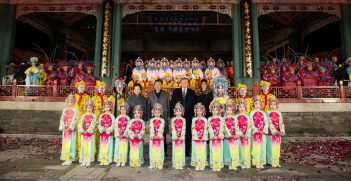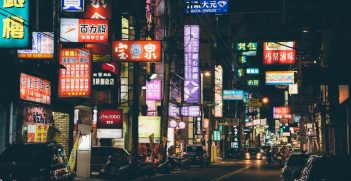Notes From Next Door: China Woos Indonesia – But What To Do?
It’s the long tail of the Idul Fitri holiday, the celebratory end of the fasting month for Indonesia’s 240 million Muslims. Although the Chinese government is officially atheist, it’s making the most of the season with some generous gestures.
The latest is an offer to try and retrieve remnants of the 1,400-tonne Indonesian submarine Nanggala 2 and the bodies of 53 crew who perished when the 44-year old German-built craft sank close to Bali last month. Indonesia doesn’t have the gear to lift chunks of an imploded steel cylinder lying 840 metres deep. The Peoples’ Liberation Army Navy (PLAN) and the US do, and they are prepared to give it a go. Washington wants to be paid. Beijing doesn’t. Unsurprisingly Jakarta, is saying ya silahkan, terima kasih (yes please, thank you).
Is this good deed snag-free? Sceptics say the gift horse’s dentures should get orthodontic scrutiny, as the PLAN is more interested in drilling sensors into the seabed and scraping topographical data than shaking down a nation deep in debt. This suspicion has foundations. Beijing’s English-language mouthpiece, Global Times, said the rescue attempt could help China “study the maritime military geography of the area where the submarine was wrecked, as well as expanding the international cooperation and influence of our navy in submarine rescue and salvage.” Such niggles are being set aside as Indonesia concentrates on getting the sailors’ remains back for land burial and searching for clues about the cause of the accident.
The salvage offer isn’t a one-off but part of a catalogue of diplomatic specials. The main COVID-19 vaccines on Indonesian clinic shelves are Sinovac and Sinopharm. The latter has just been approved by the WHO for emergency use, though it is already in the upper arms of millions in China. Late last year, China gifted three million doses of finished vaccine followed by raw material for the state-owned Bio Farma to make 20 million doses. This is a way to hearts and minds. Though they loathe his nation’s politics, Indonesians who roll up their sleeves know they’re getting protected courtesy of President Xi Jinping.
The plague is thumping the world’s fourth-most populous nation. Johns Hopkins University has recorded more than 1.75 million cases and 48,000 deaths across the archipelago since the pandemic took hold. The toll is assuredly higher as testing isn’t free and post mortems are rare.
In addition to deep-ocean salvage and preventive medicine, China has already lent more than AUD 23 billion, mainly for the president’s pet infrastructure projects. When Joko Widodo first won office in 2014 pledging new ports, rail lines, and toll roads, the national debt was $160 billion. Apart from China, the other big lenders are Singapore, Hong Kong, Japan, and Malaysia. When Widodo has to retire in 2024, he’ll hand his successor a seriously slim wallet, lighter by more than $900 billion.
Although this worries the cautious, Coordinating Maritime Affairs and Investment Minister Luhut Pandjaitan, 73, isn’t among them. At a China Business Forum earlier this year, the former general and Widodo’s eminence grise told delegates: “If you look at the amount of investment from China, it is a lot. But some people still say debt trap, debt trap. We are not that stupid, you know.” Maybe, though, they may not be so clever at collecting taxes to repay the renminbi.
To lay even more bitumen and steel and spread the debt load, Widodo has opened a sovereign wealth fund. The Indonesia Investment Authority (IIA) started this year with $6.6 billion from the state budget – a sum since doubled by the United Arab Emirates. When the IIA was still a thought bubble, Australian Treasurer Josh Frydenberg reportedly told Finance Minister Sri Mulyani Indrawati that Australia was considering joining using superannuation funds. This idea seems to be another victim of COVID-19, though the treasurer may have flipped after checking Transparency International’s latest corruption report.
Among the briefing notes for the new Australian ambassador in Jakarta, Penny Williams, will be a survey this year by Singapore’s SEAS-Yusof Ishak Institute. Though it suffers from using a small sample of well-educated opinionators, The State of Southeast Asia’s publisher is credible and the work reveals some embarrassing attitudes. To the question: “If the US is perceived as unreliable, who’d you want as a strategic partner?” Indonesians favour the EU, followed by Japan and China – all well ahead of Australia. Participants were also asked: “Who do you have the strongest confidence in to provide leadership to maintain the rules-based order and uphold international law?” Australia’s Westminster system and principles were trampled in favour of the EU and the US – even China, which sounds like a data-entry error as its record on human rights is atrocious.
Though it doesn’t seem to be atrocious to all Indonesians. Selected journalists and politicians have toured “re-education” camps, meeting happy Uyghurs and later explaining the Xinjiang campaign is to crush East Turkestan separatism, not an ancient Islamic culture. If the PLAN succeeds in lifting Nanggala 2 from its subsea grave, Beijing will score another PR triumph, putting the Middle Kingdom even further ahead of the Great South Land in the minds of the people next door.
Fortunately, Williams knows Indonesia better than many of her predecessors and speaks the language. In the 1980s she was an exchange student at a Protestant high school in central Jakarta. Three decades later, she was high commissioner to adjacent Malaysia.
Australia can’t raise subs or give vaccines, and it is too risk-averse to invest big. But Australia does help out in crises, share security tips, sell lots of grains and meats, and is cautiously exporting services like health and education. Advising on tax collection is another possibility.
Australia is also mildly keen on improving people-to-people relationships, though it doesn’t know how. Explaining better and restoring trust should top her excellency’s must-do list before China rules more than waves.
Duncan Graham is an Australian journalist in Indonesia.
This article is published under a Creative Commons License and may be republished with attribution.





